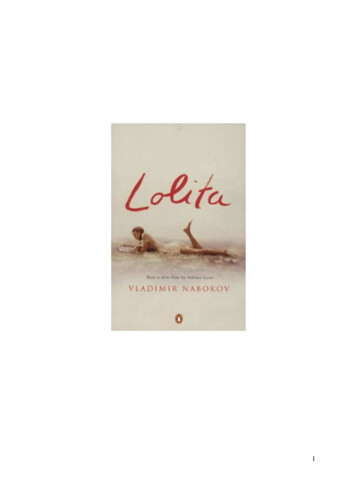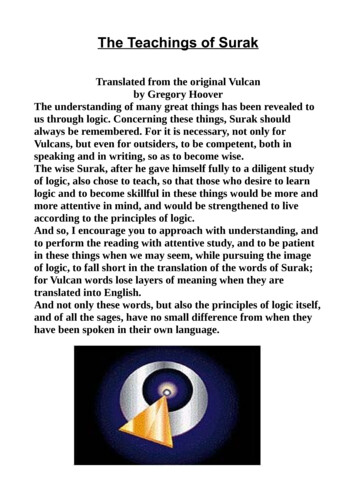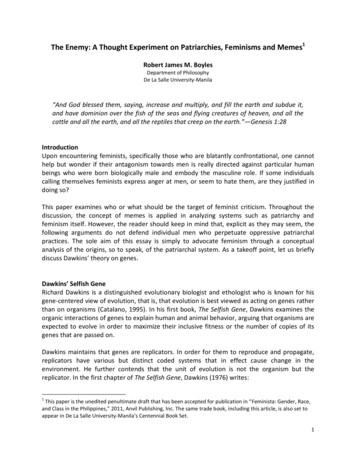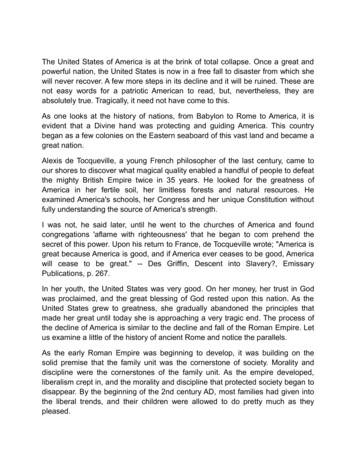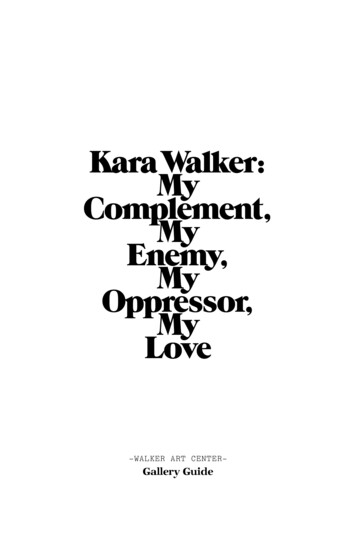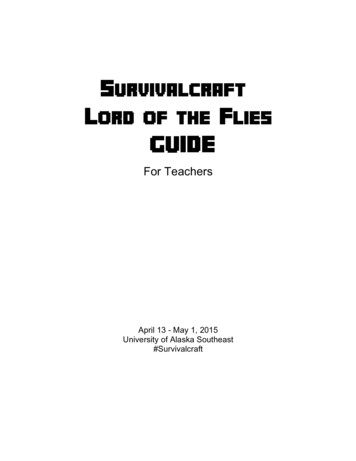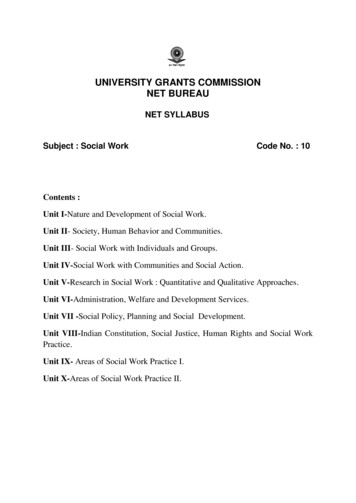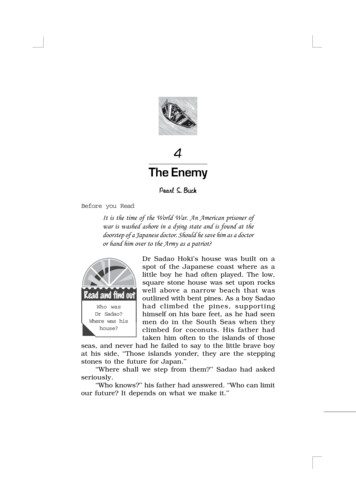
Transcription
4The EnemyPearl S. BuckBefore you ReadIt is the time of the World War. An American prisoner ofwar is washed ashore in a dying state and is found at thedoorstep of a Japanese doctor. Should he save him as a doctoror hand him over to the Army as a patriot?Dr Sadao Hoki’s house was built on aspot of the Japanese coast where as alittle boy he had often played. The low,square stone house was set upon rockswell above a narrow beach that wasoutlined with bent pines. As a boy SadaoWho washad climbed the pines, supportingDr Sadao?himself on his bare feet, as he had seenWhere was hismen do in the South Seas when theyhouse?climbed for coconuts. His father hadtaken him often to the islands of thoseseas, and never had he failed to say to the little brave boyat his side, ‘‘Those islands yonder, they are the steppingstones to the future for Japan.’’‘‘Where shall we step from them?’’ Sadao had askedseriously.‘‘Who knows?’’ his father had answered. ‘‘Who can limitour future? It depends on what we make it.’’24Vistas
Sadao had taken this into his mind as he dideverything his father said, his father who never joked orplayed with him but who spent infinite pains upon himwho was his only son. Sadao knew that his education washis father’s chief concern. For this reason he had beensent at twenty-two to America to learn all that could belearned of surgery and medicine. He had come back atthirty, and before his father died he had seen Sadao becomefamous not only as a surgeon but as a scientist. Becausehe was perfecting a discovery which would render woundsentirely clean, he had not been sent abroad with the troops.Also, he knew, there was some slight danger that the oldGeneral might need an operation for a condition for whichhe was now being treated medically, and for this possibilitySadao was being kept in Japan.Clouds were rising from the ocean now. The unexpectedwarmth of the past few days had at night drawn heavy fogfrom the cold waves. Sadao watched mists hide outlines ofa little island near the shore and then come creeping upthe beach below the house, wreathing around the pines.In a few minutes fog would be wrapped about the housetoo. Then he would go into the room where Hana, his wife,would be waiting for him with the two children.But at this moment the door opened and she lookedout, a dark-blue woollen haori1 over her kimono. She cameto him affectionately and put her arm through his as hestood, smiled and said nothing. He had met Hana inAmerica, but he had waited to fall in love with her until hewas sure she was Japanese. His father would never havereceived her unless she had been pure in her race. Hewondered often whom he would have married if he had notmet Hana, and by what luck he had found her in the mostcasual way, by chance literally, at an American professor’shouse. The professor and his wife had been kind peopleanxious to do something for their few foreign students,and the students, though bored, had accepted thiskindness. Sadao had often told Hana how nearly he hadnot gone to Professor Harley’s house that night — the rooms1haori: a loose outer garment worn over the kimono.The Enemy25
were so small, the food so bad, the professor’s wife sovoluble. But he had gone and there he had found Hana, anew student, and had felt he would love her if it were atall possible.Now he felt her hand on his arm and was aware of thepleasure it gave him, even though they had been marriedyears enough to have the two children. For they had notmarried heedlessly in America. They had finished their workat school and had come home to Japan, and when hisfather had seen her the marriage had been arranged inthe old Japanese way, although Sadao and Hana had talkedeverything over beforehand. They were perfectly happy. Shelaid her cheek against his arm.It was at this moment thatbothofthemsawsomething black come outof the mists. It was a man.He was flung up out of theocean — flung, itseemed, to his feet by abreaker. He staggered afew steps, his bodyoutlined against the mist,his arms above his head.Then the curled mists hidhim again.‘‘Who is that?’’ Hanacried. She dropped Sadao’sarm and they both leanedover the railing of theveranda. Now theysaw him again. Theman was on hishands and kneescrawling. Then they saw himfall on his face and lie there.‘‘A fisherman perhaps,’’ Sadaosaid, ‘‘washed from his boat.’’ He ranquickly down the steps and behind him26Vistas
Hana came, her wide sleeves flying. A mile or two away oneither side there were fishing villages, but here was onlythe bare and lonely coast, dangerous with rocks. The surfbeyond the beach was spiked with rocks. Somehow theman had managed to come through them — he must bebadly torn.They saw when they came toward him that indeed itwas so. The sand on one side of him had already a stain ofred soaking through.‘‘He is wounded,’’ Sadao exclaimed. He made haste tothe man, who lay motionless, his face in the sand. An oldcap stuck to his head soaked with sea water. He was inwet rags of garments. Sadao stopped, Hana at his side,and turned the man’s head. They saw the face.“A white man!” Hana whispered.Yes, it was a white man. The wet cap fell away andthere was his wet yellow hair, long, as though for manyweeks it had not been cut, and upon his young and torturedface was a rough yellow beard. He wasunconscious and knew nothing that theydid for him.Now Sadao remembered the wound,and with his expert fingers he began tosearch for it. Blood flowed freshly at histouch. On the right side of his lower backWill Dr Sadao beSadao saw that a gun wound had beenarrested on thereopened. The flesh was blackened withcharge ofharbouring anpowder. Sometime, not many days ago,enemy?the man had been shot and had not beentended. It was bad chance that the rockhad struck the wound.‘‘Oh, how he is bleeding!’’ Hana whispered again in asolemn voice. The mists screened them now completely,and at this time of day no one came by. The fishermen hadgone home and even the chance beachcombers would haveconsidered the day at an end.‘‘What shall we do with this man?’’ Sadao muttered.But his trained hands seemed of their own will to be doingwhat they could to stanch the fearful bleeding. He packedThe Enemy27
the wound with the sea moss that strewed the beach. Theman moaned with pain in his stupor but he did not awaken.‘‘The best thing that we could do would be to put himback in the sea,’’ Sadao said, answering himself.Now that the bleeding was stopped for the moment hestood up and dusted the sand from his hands.‘‘Yes, undoubtedly that would be best,’’ Hana saidsteadily. But she continued to stare down at the motionlessman.‘‘If we sheltered a white man in our house we shouldbe arrested and if we turned him over as a prisoner, hewould certainly die,’’ Sadao said.‘‘The kindest thing would be to put him back into thesea,’’ Hana said. But neither of them moved. They werestaring with a curious repulsion upon the inert figure.‘‘What is he?’’ Hana whispered.‘‘There is something about him that looks American,’’Sadao said. He took up the battered cap. Yes, there, almostgone, was the faint lettering. ‘‘A sailor,’’ he said, ‘‘from anAmerican warship.’’ He spelled it out: ‘‘U.S. Navy.’’ The manwas a prisoner of war!‘‘He has escaped.’’ Hana cried softly, ‘‘and that is whyhe is wounded.’’‘‘In the back,’’ Sadao agreed.They hesitated, looking at each other. Then Hana saidwith resolution:“Come, are we able to put him back into the sea?”“If I am able, are you?” Sadao asked.“No,” Hana said, “But if you can do it alone.”Sadao hesitated again. “The strange thing is,” he said,“that if the man were whole I could turn him over to thepolice without difficulty. I care nothing for him. He is myenemy. All Americans are my enemy. And he is only acommon fellow. You see how foolish his face is. But sincehe is wounded ”“You also cannot throw him back to the sea,” Hanasaid. “Then there is only one thing to do. We must carryhim into the house.”“But the servants?” Sadao inquired.28Vistas
“We must simply tell them that we intend to give himto the police — as indeed we must, Sadao. We must thinkof the children and your position. It would endanger all ofus if we did not give this man over as a prisoner of war.”“Certainly,” Sadao agreed. “I would not think of doinganything else.”Thus agreed, together they lifted the man. He was verylight, like a fowl that had been half-starved for a long timeuntil it is only feathers and skeleton. So, his arms hanging,they carried him up the steps and into the side door of thehouse. This door opened into a passage, and down thepassage they carried the man towards an empty bedroom.It had been the bedroom of Sadao’s father, and since hisdeath it had not been used. They laid the man on thedeeply matted floor. Everything here had been Japanese toplease the old man, who would never in his own home siton a chair or sleep in a foreign bed. Hana went to the wallcupboards and slid back a door and took out a soft quilt.She hesitated. The quilt was covered with flowered silk andthe lining was pure white silk.“He is so dirty,” she murmured in distress.“Yes, he had better be washed,” Sadao agreed. “If youwill fetch hot water I will wash him.”“I cannot bear for you to touch him,” she said. “Weshall have to tell the servants he is here. I will tell Yuminow. She can leave the children for a few minutes and shecan wash him.”Sadao considered a moment. “Let it be so,” he agreed.“You tell Yumi and I will tell the others.”But the utter pallor of the man’s unconscious facemoved him first to stoop and feel his pulse. It was faint butit was there. He put his hand against the man’s cold breast.The heart too was yet alive.“He will die unless he is operated on,” Sadao said,considering. “The question is whether he will not dieanyway.”Hana cried out in fear. “Don’t try to save him! What ifhe should live?”“What if he should die?” Sadao replied. He stood gazingThe Enemy29
down on the motionless man. This man must haveextraordinary vitality or he would have been dead by now.But then he was very young — perhaps not yet twentyfive.“You mean die from the operation?”Hana asked.“Yes,” Sadao said.Hana considered this doubtfully, and when she didnot answer Sadao turned away. “At any rate somethingmust be done with him,” he said, “and first he must bewashed.” He went quickly out of the room and Hana camebehind him. She did not wish to be left alone with thewhite man. He was the first she had seen since she leftAmerica and now he seemed to have nothing to do withthose whom she had known there. Here he was her enemy,a menace, living or dead.She turned to the nursery and called, “Yumi!”But the children heard her voice and she had to go infor a moment and smile at them and play with the babyboy, now nearly three months old.Over the baby’s soft black hair she motioned with hermouth, “Yumi — come with me!”“I will put the baby to bed,” Yumi replied. “He is ready.”She went with Yumi into the bedroom next to thenursery and stood with the boy in her arms while Yumispread the sleeping quilts on the floor and laid the babybetween them.Then Hana led the way quickly and softly to thekitchen. The two servants were frightened at what theirmaster had just told them. The old gardener, who was alsoa house servant, pulled the few hairs on his upper lip.“The master ought not to heal the wound of this whiteman,” he said bluntly to Hana. “The white man ought todie. First he was shot. Then the sea caught him andwounded him with her rocks. If the master heals what thegun did and what the sea did they will take revenge on us.”“I will tell him what you say,” Hana replied courteously.But she herself was also frightened, although she was notsuperstitious as the old man was. Could it ever be well to30Vistas
help an enemy? Nevertheless she told Yumi to fetch thehot water and bring it to the room where the white manwas.She went ahead and slid back the partitions. Sadaowas not yet there. Yumi, following, put down her woodenbucket. Then she went over to the white man. When shesaw him her thick lips folded themselves into stubbornness.“I have never washed a white man,” she said, “and I willnot wash so dirty a one now.”Hana cried at her severely. “You will do what yourmaster commands you!”There was so fierce a look of resistance upon Yumi’sround dull face that Hana felt unreasonably afraid. Afterall, if the servants should report something that was notas it happened?“Very well,” she said with dignity. “You understand weonly want to bring him to his senses so that we can turnhim over as a prisoner?”“I will have nothing to do with it,” Yumi said, “I am apoor person and it is not my business.”“Then please,” Hana said gently, “return to your ownwork.”At once Yumi left the room. But this left Hana withthe white man alone. She might have been too afraid tostay had not her anger at Yumi’s stubbornness nowsustained her.“Stupid Yumi,” she mutteredfiercely. “Is this anything but a man?And a wounded helpless man!”In the conviction of her ownsuperiority she bent impulsively anduntied the knotted rugs that kept theWill Hana help thewhite man covered. When she had hiswounded manbreast bare she dipped the small cleanand wash himtowel that Yumi had brought into theherself?steaming hot water and washed his facecarefully. The man’s skin, though roughwith exposure, was of a fine texture and must have beenvery blond when he was a child.The Enemy31
While she was thinking these thoughts, though notreally liking the man better now that he was no longer achild, she kept on washing him until his upper body wasquite clean. But she dared not turn him over. Where wasSadao? Now her anger was ebbing, and she was anxiousagain and she rose, wiping her hands on the wrong towel.Then lest the man be chilled, she put the quilt over him.“Sadao!” she called softly.He had been about to come in when she called. Hishand had been on the door and now he opened it. She sawthat he had brought his surgeon’s emergency bag and thathe wore his surgeon’s coat.“You have decided to operate!” she cried.“Yes,” he said shortly. He turned his back to her andunfolded a sterilized towel upon the floor of the tokonoma2alcove, and put his instruments out upon it.“Fetch towels,” he said.She went obediently, but how anxious now, to the linenshelves and took out the towels. There ought a0lso to beold pieces of matting so that the blood would not ruin thefine floor covering. She went out to the back veranda wherethe gardener kept strips of matting with which to protectdelicate shrubs on cold nights and took an armful of them.But when she went back into the room, she saw this wasuseless. The blood had already soaked through the packing inthe man’s wound and had ruined the mat under him.“Oh, the mat!” she cried.“Yes, it is ruined,” Sadao replied, as though he did notcare. “Help me to turn him,” he commanded her.She obeyed him without a word, and he began to washthe man’s back carefully.“Yumi would not wash him,” she said.“Did you wash him then?” Sadao asked, not stoppingfor a moment his swift concise movements.“Yes,” she said.He did not seem to hear her. But she was used to hisabsorption when he was at work. She wondered for a2tokonoma: a niche or an alcove in a Japanese home for displaying aflower arrangement, kakemono, or other piece of art.32Vistas
moment if it mattered to him what was the body uponwhich he worked so long as it was for the work he did soexcellently.“You will have to give the anesthetic if he needs it,” hesaid.“I?” she repeated blankly. “But never have I!”“It is easy enough,” he said impatiently.He was taking out the packing now, and the bloodbegan to flow more quickly. He peered into the wound withthe bright surgeon’s light fastened on his forehead. “Thebullet is still there,” he said withcool interest. “Now I wonderhow deep this rock wound is.If it is not too deep it maybe that I can get the bullet.But the bleeding is notsuperficial. He haslost much blood.”At this momentHana choked. Helooked up and saw her face the colour of sulphur.“Don’t faint,” he said sharply. He did not put down hisexploring instrument. “If I stop now the man will surelydie.” She clapped her hands to her mouth and leaped upand ran out of the room. Outside in the garden he heardher retching. But he went on with his work.“It will be better for her to empty her stomach,” hethought. He had forgotten that of course she had neverseen an operation. But her distress and his inability to goto her at once made him impatient and irritable with thisman who lay like dead under his knife.The Enemy33
“This man.” he thought, “there is no reason underheaven why he should live.”Unconsciously this thought made him ruthless andhe proceeded swiftly. In his dream the man moaned butSadao paid no heed except to mutter at him.“Groan,” he muttered, “groan if you like. I am not doingthis for my own pleasure. In fact, I do not know why I amdoing it.”The door opened and there was Hana again.“Where is the anesthetic?” she asked in a clear voice.Sadao motioned with his chin. “It is as well that youcame back,” he said. “This fellow is beginning to stir.”She had the bottle and some cotton in her hand.“But how shall I do it?” she asked.“Simply saturate the cotton and hold it near hisnostrils,” Sadao replied without delaying for one momentthe intricate detail of his work. “When he breathes badlymove it away a little.”She crouched close to the sleeping face of the youngAmerican. It was a piteously thin face, she thought, andthe lips were twisted. The man was suffering whether heknew it or not. Watching him, she wondered if the storiesthey heard sometimes of the sufferings of prisoners weretrue. They came like flickers of rumour, told by word ofmouth and always contradicted. In the newspapers thereports were always that wherever the Japanese armieswent the people received them gladly, with cries of joy attheir liberation. But sometimes she remembered such menas General Takima, who at home beat his wife cruelly,though no one mentioned it now that he had fought sovictorious a battle in Manchuria. If a man like that couldbe so cruel to a woman in his power, would he not be cruelto one like this for instance?She hoped anxiously that this young man had not beentortured. It was at this moment that she observed deep redscars on his neck, just under the ear.“Those scars,” she murmured, lifting her eyes to Sadao.But he did not answer. At this moment he felt the tip ofhis instrument strike against something hard, dangerously34Vistas
near the kidney. All thought left him. He felt only the purestpleasure. He probed with his fingers, delicately, familiarwith every atom of this human body. His old Americanprofessor of anatomy had seen to that knowledge. “Ignoranceof the human body is the surgeon’s cardinal sin, sirs!” hehad thundered at his classes year after year. “To operatewithout as complete knowledge of the body as if you hadmade it — anything less than that is murder.”“It is not quite at the kidney, my friend,” Sadaomurmured. It was his habit to murmur to the patient whenhe forgot himself in an operation. “My friend,” he alwayscalled his patients and so now he did, forgetting that thiswas his enemy.Then quickly, with the cleanest and most precise ofincisions, the bullet was out. The man quivered but hewas still unconscious. Nevertheless he muttered a fewEnglish words.“Guts,” he muttered, choking. “They got.my guts.”“Sadao!” Hana cried sharply.“Hush,” Sadao said.The man sank again into silence so profound that Sadaotook up his wrist, hating the touch of it. Yes, there wasstill a pulse so faint, so feeble, but enough, if he wantedthe man to live, to give hope.“But certainly I do not want this man to live,” hethought.“No more anesthetic,” he told Hana.He turned as swiftly as though he had never pausedand from his medicines he chose a small vial and from itfilled a hypodermic and thrust it intothe patient’s left arm. Then puttingdown the needle, he took the man’s wristagain. The pulse under his fingersfluttered once or twice and then grewstronger.What will“This man will live in spite of all,”Dr Sadao and hishe said to Hana and sighed.wife do with theThe young man woke, so weak, hisman?blue eyes so terrified when he perceivedThe Enemy35
where he was, that Hana felt compelled to apologise. Sheherself served him, for none of the servants would enter theroom.When she came in the first time, she saw him summonhis small strength to be prepared for some fearful thing.“Don’t be afraid,” she begged him softly.“How come. you speak English ” he gasped.“I was a long time in America,” she replied.She saw that he wanted to reply to that but he couldnot, and so she knelt and fed him gently from the porcelainspoon. He ate unwillingly, but still he ate.“Now you will soon be strong,” she said, not liking himand yet moved to comfort him.He did not answer.When Sadao came in the third day after the operation,he found the young man sitting up, his face bloodless withthe effort.“Lie down,” Sadao cried. “Do you want to die?”He forced the man down gently and strongly andexamined the wound. “You may kill yourself if you do thissort of thing,” he scolded.“What are you going to do with me?” the boy muttered.He looked just now barely seventeen. “Are you going to handme over?”For a moment Sadao did not answer. He finished hisexamination and then pulled the silk quilt over the man.“I do not know myself what I shall do with you,” hesaid. “I ought of course to give you to the police. You are aprisoner of war — no, do not tell me anything.” He put uphis hand as he saw the young man was about to speak.“Do not even tell me your name unless I ask it.”They looked at each other for a moment, and then theyoung man closed his eyes and turned his face to the wall.“Okay,” he whispered, his mouth a bitter line.Outside the door Hana was waiting for Sadao. He sawat once that she was in trouble.“Sadao, Yumi tells me the servants feel they cannotstay if we hide this man here any more,” she said. “Shetells me that they are saying that you and I were so long in36Vistas
America that we have forgotten to think of our own countryfirst. They think we like Americans.”“It is not true,” Sadao said harshly “Americans areour enemies. But I have been trained not to let a man dieif I can help it.”“The servants cannot understand that,” she saidanxiously.“No,” he agreed.Neither seemed able to say more, and somehow thehousehold dragged on. The servants grew more watchful.Their courtesy was as careful as ever, but their eyes werecold upon the pair to whom they were hired.“It is clear what our master ought to do,” the oldgardener said one morning. He had worked with flowersall his life, and had been a specialist too in moss. ForSadao’s father he had made one of the finest moss gardensin Japan, sweeping the bright green carpet constantly sothat not a leaf or a pine needle marred the velvet of itssurface. “My old master’s son knows very well what heought to do,” he now said, pinching a bud from a bush ashe spoke. “When the man was so near death why did henot let him bleed?”“That young master is so proud of his skill to save lifethat he saves any life,” the cook said contemptuously. Shesplit a fowl’s neck skillfully and held the fluttering bird andlet its blood flow into the roots of a wistaria vine. Blood isthe best of fertilisers, and the old gardener would not lether waste a drop of it.“It is the children of whom we must think,” Yumi saidsadly. “What will be their fate if their father is condemnedas a traitor?”They did not try to hide what they said from the ears ofHana as she stood arranging the day’s flowers in theveranda near by, and she knew they spoke on purposethat she might hear. That they were right she knew too inmost of her being. But there was another part of her whichshe herself could not understand. It was not sentimentalliking of the prisoner. She had come to think of him as aprisoner. She had not liked him even yesterday when heThe Enemy37
had said in his impulsive way, “Anyway, let me tell youthat my name is Tom.” She had only bowed her little distantbow. She saw hurt in his eyes but she did not wish toassuage it. Indeed, he was a great trouble in this house.As for Sadao, every day he examined the woundcarefully. The last stitches had been pulled out thismorning, and the young man would, in a fortnight be nearlyas well as ever. Sadao went back to his office and carefullytyped a letter to the Chief of police reporting the wholematter. “On the twenty-first day of February an escapedprisoner was washed up on the shore in front of my house.”So far he typed and then he opened a secret drawer of hisdesk and put the unfinished report into it.On the seventh day after that, two things happened. Inthe morning the servants left together, their belongings tied inlarge square cotton kerchiefs. When Hana got up in the morningnothing was done, the house not cleaned and the food notprepared, and she knew what it meant. She was dismayedand even terrified, but her pride as a mistress would not allowher to show it. Instead, she inclined her head gracefully whenthey appeared before her in the kitchen, and she paid them offand thanked them for all that they had done for her. Theywere crying, but she did not cry. The cook and the gardenerhad served Sadao since he was a little boy in his father’shouse, and Yumi cried because of the children. She was sogrieving that after she had gone she ran back to Hana.“If the baby misses me too much tonight, send for me.I am going to my own house and you know where it is.”“Thank you,” Hana said smiling. But she told herselfshe would not send for Yumi however the baby cried.She made the breakfast and Sadao helped with thechildren. Neither of them spoke of the servants beyond thefact that they were gone. But after Hana had taken morningfood to the prisoner, she came back to Sadao.“Why is it we cannot see clearly what we ought to do?”she asked him. “Even the servants see more clearly thanwe do. Why are we different from other Japanese?”Sadao did not answer. But a little later he went intothe room where the prisoner was and said brusquely, “Today38Vistas
you may get up on your feet. I want you to stay up only fiveminutes at a time. Tomorrow you may try it twice as long.It would be well that you get back your strength as quicklyas possible.”He saw the flicker of terror on the young face that wasstill very pale. “Okay,” the boy murmured. Evidently hewas determined to say more. “I feel I ought to thank you,Doctor, for having saved my life.”“Don’t thank me too early,” Sadao said coldly. He sawthe flicker of terror again in the boy’s eyes — terror asunmistakable as an animal’s. The scars on his neck werecrimson for a moment. Those scars! What were they? Sadaodid not ask.In the afternoon the second thing happened. Hana,working hard on unaccustomed labour, saw a messengercome to the door in official uniform. Her hands went weakand she could not draw her breath. The servants musthave told already. She ran to Sadao, gasping, unable toutter a word. But by then the messenger had simplyfollowed her through the garden and there he stood. Shepointed at him helplessly.Sadao looked up from his book. Hewas in his office, the other partition ofwhich was thrown open to the gardenfor the southern sunshine.“What is it?” he asked themessenger and then he rose, seeing theWill Dr Sadao beman’s uniform.arrested on the“You are to come to the palace,” thecharge ofman said. “The old General is in painharbouring anagain.”enemy?“Oh,” Hana breathed, “is that all?”“All?” the messenger exclaimed.“Is it not enough?”“Indeed it is,” she replied. “I am very sorry.”When Sadao came to say goodbye, she was in thekitchen, but doing nothing. The children were asleep andshe sat merely resting for a moment, more exhausted fromher fright than from work.The Enemy39
“I thought they had come to arrest you”, she said.He gazed down into her anxious eyes. “I must get rid ofthis man for your sake,” he said in distress. “Somehow Imust get rid of him.”(Sadao goes to see the General)“Of course,” the General said weakly, “I understandfully. But that is because, I once took a degree in Princeton.So few Japanese have.”“I care nothing for the man, Excellency,” Sadao said,“but having operated on him with such success ”“Yes, yes” the General said. “It only makes me feel youmore indispensable to me. Evidently you can save anyone— you are so skilled. You say you think I can stand onemore such attack as I have had today?”“Not more than one,” Sadao said.“Then certainly I can allow nothing to happen to you,”the General said with anxiety. His long pale Japanese facebecame expressionless, which meant that he was in deepthought. “You cannot be arrested,” the General said, closinghis eyes. “Suppose you were condemned to death and thenext day I had to have my operation?”“There are other surgeons, Excellency,” Sadao suggested.“None I trust,” the General replied. “The best ones havebeen trained by Germans and would consider the operationsuccessful even if I died. I do not care for their point ofview.” He sighed. “It seems a pity that we cannot bettercombine the German ruthlessness with the Americansentimentality. Then you could turn your prisoner over toexecution and yet I could be sure you would not murder mewhile I was unconscious.” The General laughed. He had anunusual sense of humour. “As a Japanese, could you notcombine these two foreign elements?” he asked.Sadao smiled. “I am not quite sure,” he said, “but foryour sake I would be willing to try, Excellency.”The General shook his head. “I had rather not be thetest case,” he said. He felt suddenly weak and overwhelmedwith the cares of his life as an official in times such as thesewhen repeated victory brought great responsibilities all over40Vistas
the south Pacific. “It is very unfortunate that this man shouldhave washed up on your doorstep,” he said irritably.“I feel it so myself,” Sadao said gently.“It would be best
the old Japanese way, although Sadao and Hana had talked everything over beforehand. They were perfectly happy. She laid her cheek against his arm. It was at this moment that both of them saw something black come out of the mists. It was a man. He was flung up out of the ocean — flung, it
